Rosh Hashanah Message for Pro-Israel College Kids
You are not alone.
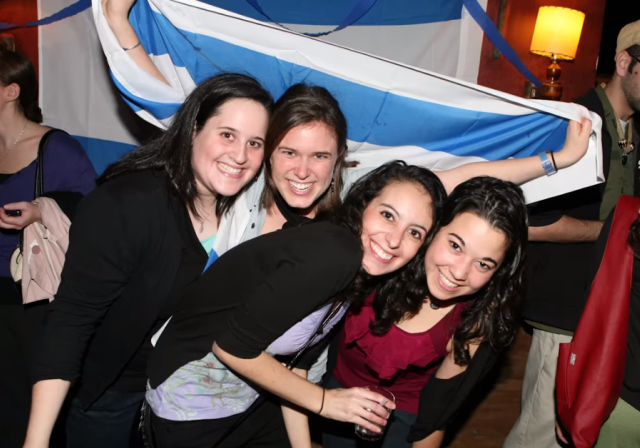
Tonight at sundown begins the two-day festival of Rosh Hashanah—the Jewish New Year. It marks the start of the fall holiday season which culminates on October 25, a day dedicated to celebrating the Torah.
It’s become a custom to wish people a sweet, happy, and healthy New Year by sending e-cards:


But this year’s greeting from Jerusalem U was unusual. Jerusalem U is a film-based educational initiative focused on combating campus antisemitism. It’s best known for its “Crossing the Line” documentaries which expose an increasingly hostile campus environment for Jews and Zionists (see below).
This week, its holiday greeting came in the form of a short video.
In it, two college students—Nina and Michelle—talk about having to hide their Judaism, feeling ashamed, and questioning their attachment to Israel.
They come off as inadequately prepared to confront the relentless campaigning against Israel on their campus. Jerusalem U’s Rabbi Shore bids viewers a Shana Tova (Good New Year) and recommends that the group’s videos be distributed widely so that students like Nina and Michelle can be more effective advocates for their Zionist positions.
Jerusalem U’s videos are useful. But Jewish students—and others for whom Zionism is central to their identity—are going to need a lot more help than a few videos can provide.
Why Campuses Won’t Ban BDS
As we’ve noted in many posts (see our most recent here), some American campuses are places so rife with virulent anti-Israel instructional programming that even Jewish Studies faculty are unwilling to advance a perspective different than the one BDS offers.
To be sure, most campuses haven’t gone as far off the rails as places like Vassar or Oberlin.
But the anti-Israel atmosphere on campus is growing everywhere, and the mainstreaming of antisemitism is worrying.
Physical assaults and verbal threats of pro-Israel students, the defacement of the dorm rooms of Jewish students and campus property with swastikas, and the disruption of Israeli speakers and Israel-themed events are all on the rise (especially in certain parts of the country like the Chicago area).
These are obvious suppressions of free expression or a violation of state law and campus rules of conduct. But the reality is that BDS activism rarely rises to this level of harassment that would be considered unprotected free speech.
So Students for Justice in Palestine (SJP)—the campus arm of the BDS movement—continues to enjoy the status of a legitimate student group.
Recent investigations have revealed that it’s generously funded by the ADL-flagged American Muslims for Palestine, a group whose leaders once worked for an organization that helped to finance Hamas.
For some, that should be enough to banish it from campus.
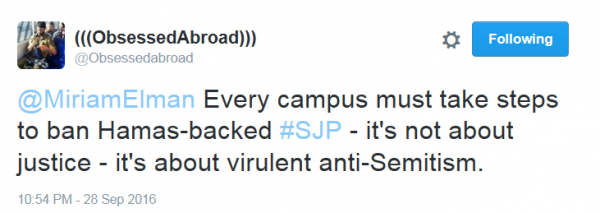
But the widespread view is that SJP’s apartheid walls, mock checkpoints, and die-ins shouldn’t be barred from campus merely on the grounds that pro-Israel students find them offensive, hurtful, and demeaning.

Apartheid Wall | Columbia University
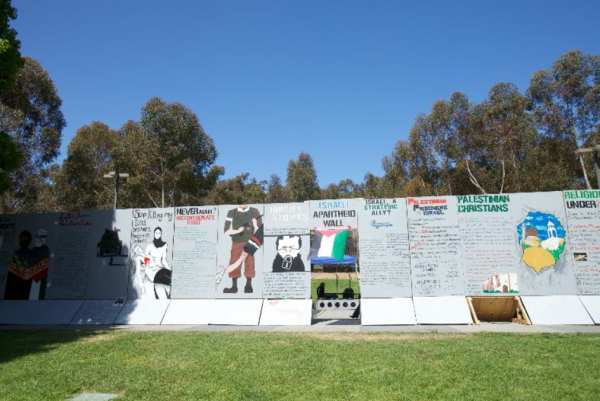
Apartheid Wall | UCSD
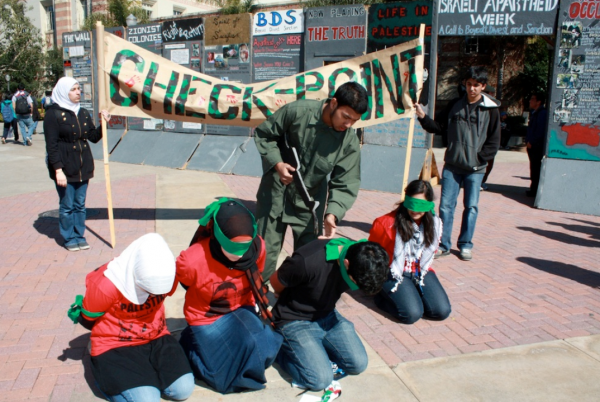
Mock Checkpoint | UCLA

Die-in | Boston | with Students for Justice in Palestine chapter participation | July 14, 2014
Last week, Geoffrey R. Stone, a prominent law professor and First Amendment scholar at the University of Chicago, summed up this general sentiment well in a high-profile address devoted to examining the importance of free expression on campus (see a summary of the speech here; the full-embed of the address is below and well-worth listening to).
In it, he passionately defended the university as a place where even the most “loathsome” and “distasteful” arguments should “absolutely not” be censored. He also included SJP in a “broad array” of student organizations that universities should “unequivocally support and indeed encourage”:
These organizations are a central part of who we are, and they represent a critical part of our culture that the University enthusiastically endorses, supports, and cherishes. They are meant to be empowering, intellectually robust and, when necessary, safe”.
So for the foreseeable future SJP’s place on campus is pretty secure.
How Universities Can Better Protect Jewish and Zionist Students
So what can colleges and universities do to support students like Nina and Michelle without running roughshod over hard-won free speech rights on campus?
Administrators and faculty can both do a lot more.
As argued in a recent op-ed by Tammi Rossman-Benjamin, the director of the AMCHA Initiative, university leaders shouldn’t just be calling for a civil discourse based on mutual respect.
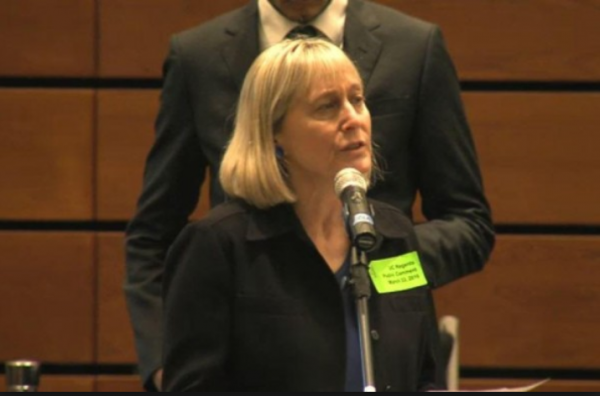
Tammi Rossman-Benjamin
They should be exercising their own free-speech rights by helping students to acknowledge antisemitism when it occurs (rather than tolerating their “dismissing the reality” of the problem). And they can also begin calling attention to vehement anti-Israel expression (the kind that clearly crosses the line into a hatred of Jews) as a type of racist bigotry to be stigmatized along with other kinds of intolerant hate speech.
Good. Admin exercising its free speech rights to condemn bigotry & taking #antisemitism on its campus seriously. Wish more would step up. https://t.co/3F26a1uQlu
— Miriam F. Elman (@MiriamElman) September 29, 2016
Faculty too can call out attacks on Jewish identity disguised as opposition to Israel.
But the most important contribution faculty can make is to offer “more and better speech” to counter the “simplistic narratives of good and evil” that accuse kids like Nina and Michelle of being complicit in Israel’s alleged human rights abuses—a country that BDS views as a fundamentally illegitimate state whose time has passed.
Conclusion
Nina and Michelle—who appear on Jerusalem U’s latest Rosh Hashanah greeting like deer caught in the headlights—deserve the chance to beat BDS on the “battlefield of ideas” and to win the day by facts and persuasion.
But for them to really have a fair shot at responding effectively to BDS voices on their campus, the university is going to have to provide a balanced curriculum that will expose them to alternative perspectives.
Such a course of instruction wouldn’t ban BDS or its central claims.
A great deal of material written from the BDS perspective appears in the peer-reviewed scholarly literature, for example in the Journal of Palestine Studies. Pro-Israel faculty committed to campus free speech should practice what they preach by assigning it to their students so that they too can challenge themselves (and even reconsider some of their positions).
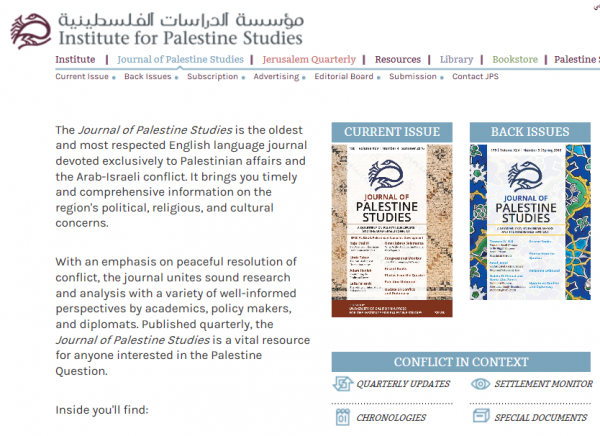
Instead of banishing the stuff from syllabi, a balanced curriculum would open up the BDS perspective to a robust inquiry. The debate would consider not only Israel’s flaws and culpability but also Palestinian mistakes and intransigence, the violence and oppressions it commits, and its own anti-Jewish bigotry.
The problem is that BDS-promoting faculty don’t actively solicit this kind of viewpoint diversity because they essentially insist on an uncontroversial, single truth. Anyone who disagrees must by definition be a bigot, a racist, and a colonial sympathizer.
So more decent professors are going to need to muster the moral courage to stand against this censorship of ideas and the BDS effort to subvert the academic enterprise and undermine the liberal arts.
University administrators should give them their full backing.
Miriam F. Elman is an associate professor of political science at the Maxwell School of Citizenship & Public Affairs, Syracuse University where she was recently appointed the Robert McClure Faculty Scholar for her commitment to citizenship and undergraduate education. She is the editor of five books and the author of over 60 journal articles, book chapters, and government reports on topics related to international and national security, religion and politics in the Middle East, the Israeli-Palestinian conflict. She also frequently speaks and writes on the Boycott, Divestment, and Sanctions (BDS) anti-Israel movement. Follow her on Twitter @MiriamElman
Donations tax deductible
to the full extent allowed by law.








Comments
While your heart is in the right place – your brain is not.
I sent my kids post High School for a year of study in Jerusalem, ISRAEL.
We need to send ALL our post high school kids to Israel.
Actually I urge my fellow Jews to make Aliyah. For the past 2,000 years we have prayed, cried, wept for a return to Zion.
With this New Year (5777),
we the Generation of the Galut,
Must also be the Generation of the Redemption.
History may not repeat itself, but it does rhyme.
As Jabotinky, in the 1930’s was warning Jews,
I (no Jabotinsky) can see the writing on the University
Walls – antisemitism, in all it’s forms is coming again.
I have encouraged my kids and all my family that we need
to start packing our bags.
It’s the Start of the New Year – the Talmud tells us
that 90% of the Egyptian Hebrews refused the evidence of
their own eyes and refused to leave,
are we also refusing to see the evidence of our own eyes ?
Who you gonna believe yer lyin’ eyes ?
“chag kasher v’same’ach” (חַג כָּשֵׁר וְשָׂמֵחַ).
I would also remind our Jewish kids that they should also remember the rest of their families. There are two books where the non-Jewish women turned out to be very important: Esther and Ruth.
Ester married outside of the tribe, and was therefore in a position to intervene against a bad government. Ruth married into the tribe and became the great-grandmother to King David.
The Jews in Europe forgot the lessons of those two books, and when their kids married outside the tribe, the parents threw them out of the family, sat shiva for them, and pretended they had died. And so, when perverts took over Germany, there was nobody in the general population to raise the alarm and put a stop to the nonsense. There were no Naomis, no Ruths, no Esthers, and above all, no Mordecais.
Jewish families in the United States do not have to follow this pattern. They may be more dilute, but they have cousins, friends, and allies who have a low tolerance for injustice.